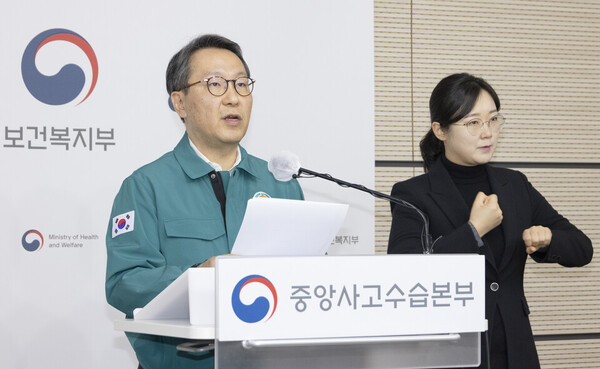The Ministry of Health and Welfare has dismissed as untrue claims that the increase in medical school enrollment quotas is for election purposes and that the government and medical community will adjust the size of the increase after the election.
The ministry added that the increased medical school admission quota will be allocated to schools by April.
The ministry said so during a briefing at the Central Accident Management Headquarters to deal with possible collective action by doctors on Tuesday.
The ministry “expressed relief” that there was no statement of intent to take collective action after the Korean Intern and Resident Association's (KIRA) extraordinary meeting, which continued from Monday night to Tuesday morning.

"We know that our daily lives are possible because medical professionals fight against diseases day and night," Second Vice Minister of Health and Welfare Park Min-soo said. "The government will accelerate healthcare reforms to improve hospitals’ working conditions and make them a sustainable workplace."
However, the ministry will closely monitor the situation as the medical community has yet to decide whether to take collective action.
Regarding the possibility that interns and residents will take collective action by not extending contracts with training hospitals, the ministry believes it would be difficult to implement based on its preliminary examination.
The government also expressed that if the trainee doctors' medical work is to rule by not doing overtime beyond legal working hours, the government will let each medical institution respond appropriately rather than making responses on a central governmental level.
Concerning the possibility that interns would not apply for resident courses after their internship ends, the government said it would persuade and talk to them as much as possible instead of trying to solve it by law.
During the last medical collective action in 2020, the government provided guidelines to localities to issue an order to reopen clinics if the percentage of striking clinics in the region is more than 30 percent, and the local governments will move according to the same guidelines based on the 30 percent work stoppage rate.
Vice Minister Park also clarified the government’s position on various claims related to the increased number of medical school students.
First, Park said it is not true that the announcement of increasing the number of medical school seats was made for the election, and the government will compromise with the medical community to cut down on the quota increase after the election.
"I would like to reiterate that the policy to increase the number of doctors was a decision made solely for public health," Vice Minister Park said. "The Healthy and Welfare Ministry will expedite the relevant procedures in consultation with the Ministry of Education so that the allocation by the school can be finalized before April."
Park also refuted claims that the government's essential medical reform is a policy to kill and enslave doctors.
"The essential medical care reform is for the benefit of both doctors and the public," Park said, explaining that it is a policy that creates an environment where doctors engaged in essential medical care can practice with confidence by providing reasonable compensation and reducing judicial burdens.
He said that the government's tough response to the collective action is a necessary measure to protect public life and health.
"If doctors abide by the law and do not leave their patients, there will be no problem for anyone," he said. "As Minister Cho Kyoo-hong said in a letter to doctors, the government is always open for a heart-to-heart dialogue."
In response to some claims in the medical community that favor increasing the number of medical school students but believe that 2,000 is too many, Park said, "The increase isn't excessive, and it's long overdue. Considering the shortage of doctors after 19 years of no increase, it's not much at all."
Vice Minister Park also said that the ministry is open to any form of debate, including a TV debate, which the Korean Medical Association has been advocating for, on topics including the enrollment quota increase and essential medical policy package.
Vice Minister Park also expressed his personal position on the rumor that he seeks to increase the number of medical schools by 2,000 because his child is a high school senior this year.
"My daughter is indeed in her third year of high school, but the vice minister of health and welfare does not make this important decision alone," Park said. "My daughter is currently in an international class. She is preparing to study abroad and has nothing to do with the Korean university exam."
Related articles
- Trainee doctors threaten to quit in protest to sharp increase in med school students
- Korea's major medical school expansion plan faces backlash from medical community
- Medical community gears up for showdown as government mulls surge in medical school enrollments
- Korea's health minister stresses need to increase medical students at OECD meet
- ‘86% of junior doctors will strike if medical student number increases’
- Trainee doctors at ‘Big 5’ hospitals to resign en masse on Monday
- Government pressures medical schools to disclose student information amid collective leave of absence protest

